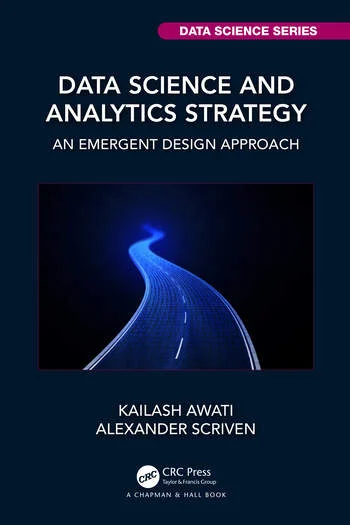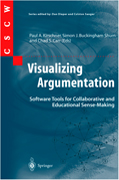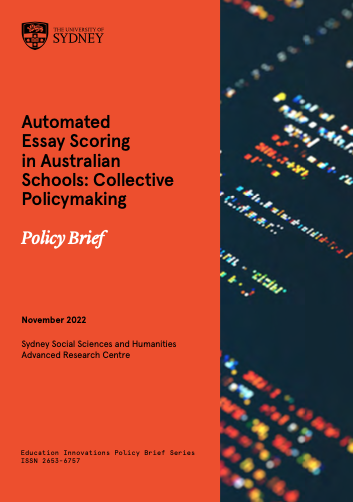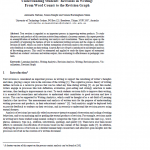Browse/search within each tab all publications/reports by CIC’s academics and doctoral researchers, most recent at top. Search across the entire CIC website to find news stories about the authors, related events and projects.
Conferences
Note that in our disciplines (computing sciences, educational technology, learning analytics, AI in education) papers accepted in the top tier conferences are double-blind reviewed, full length articles, archived in the digital libraries of professional societies such as ACM and IEEE.
Ramanathan, S., Lim, L.-A., Mottaghi, Nazanin R., & Buckingham Shum, S. (2025). When the Prompt Becomes the Codebook: Grounded Prompt Engineering (GROPROE) and its Application to Belonging Analytics. Proceedings of the 15th International Learning Analytics and Knowledge Conference, Dublin. https://doi.org/10.1145/3706468.3706564
Lee, S. C., Narayan, B., Buckingham Shum, S., Ng, S., & Kocaballi, A. B. (2025). Making AI Functional with Workarounds: An Insider’s Account of Invisible Labour in Organisational Politics. Australasian Conference on Information Systems (ACIS 2025), Brisbane. Open Access: http://hdl.handle.net/10453/190882
Ferguson, R., Gopalan, Y., & Buckingham Shum, S. (2025). What’s the Value of a Doctoral Consortium? Analysing a Decade of LAK DCs as a Community of Practice. Proceedings of the 15th International Learning Analytics and Knowledge Conference, https://doi.org/10.1145/3706468.3706563
Echeverria, V., Zhao, L., Alfredo, R., Milesi, M. E., Jin, Y., Abel, S., Fan, J. X., Yan, L., Dix, S., Wotherspoon, R., Li, X., Jaggard, H. A., Osborne, A., Shum, S. B., Gasevic, D., & Martinez-Maldonado, R. (2025). TeamVision: An AI-powered Learning Analytics System for Supporting Reflection in Team-based Healthcare Simulation. Proceedings of the 2025 CHI Conference on Human Factors in Computing Systems, https://doi.org/10.1145/3706598.3713395
Benson, H., Williams, K., Amador Fernandez, N., Buckingham Shum, S., Lim, L.-A., & Dickson-Deane, C. (2025). Cultivating lifelong learning in pharmacy: supporting pharmacy student learning journeys with dispositional learning analytics. Life Long Learning in Pharmacy Conference (July 7-10, 2025), Sydney. https://www.lllpharm2025.com/
Bakharia, A., Shibani, A., Lim, L.-A., McCluskey, T., & Buckingham Shum, S. (2025). From Transcripts to Themes: A Trustworthy Workflow for Qualitative Analysis Using Large Language Models. In: From Data to Discovery: LLMs for Qualitative Analysis in Education (Workshop: 15th International Learning Analytics and Knowledge Conference), Dublin, IRE. https://ceur-ws.org/Vol-3995/LLMQUAL_paper1.pdf
Lee, M., Gero, K. I., Chung, J. J. Y., Buckingham Shum, S., Raheja, V., Shen, H., Venugopalan, S., Wambsganss, T., Zhou, D., Alghamdi, E. A., August, T., Bhat, A., Choksi, M. Z., Dutta, S., Guo, J. L. C., Hoque, M. N., Kim, Y., Knight, S., Neshaei, S. P., Shibani, A., Shrivastava, D., Shroff, L., Sergeyuk, A., Stark, J., Sterman, S., Wang, S., Bosselut, A., Buschek, D., Chang, J. C., Chen, S., Kreminski, M., Park, J., Pea, R., Rho, E. H. R., Shen, Z. & Siangliulue, P. (2024). A Design Space for Intelligent and Interactive Writing Assistants. In Proceedings of the ACM Conference on Human Factors in Computing Systems (CHI ’24), May 11–16, 2024, Honolulu. ACM, New York, NY, USA, 34 pages. https://doi.org/10.1145/3613904.3642697 [Interactive tool]
Sriram Ramanathan, Simon Buckingham Shum, and Lisa-Angelique Lim. 2024. To what extent do responses to a single survey question provide insights into students’ sense of belonging?. In The 14th Learning Analytics and Knowledge Conference (LAK ’24), March 18–22, 2024, Kyoto, Japan. ACM, NewYork, NY, USA, 7 pages. https://doi.org/10.1145/3636555.3636916
Kitto, K., & Gibson, A. (2024). Places to intervene in complex learning systems. In Proceedings of the 14th Learning Analytics and Knowledge Conference (LAK ’24). Association for Computing Machinery, New York, NY, USA, 929–935. https://doi.org/10.1145/3636555.3636938
Gloria Milena Fernandez-Nieto, Roberto Martinez-Maldonado, Vanessa Echeverria, Kirsty Kitto, Dragan Gašević, and Simon Buckingham Shum. 2024. Data Storytelling Editor: A Teacher-Centred Tool for Customising Learning Analytics Dashboard Narratives. In Proceedings of the 14th Learning Analytics and Knowledge Conference (LAK ’24). Association for Computing Machinery, New York, NY, USA, 678–689. https://doi.org/10.1145/3636555.3636930
Vanessa Echeverria, Lixiang Yan, Linxuan Zhao, Sophie Abel, Riordan Alfredo, Samantha Dix, Hollie Jaggard, Rosie Wotherspoon, Abra Osborne, Simon Buckingham Shum, Dragan Gasevic, and Roberto Martinez-Maldonado. 2024. TeamSlides: a Multimodal Teamwork Analytics Dashboard for Teacher-guided Reflection in a Physical Learning Space. In Proceedings of the 14th Learning Analytics and Knowledge Conference (LAK ’24). Association for Computing Machinery, New York, NY, USA, 112–122. https://doi.org/10.1145/3636555.3636857
Buckingham Shum, S. (2024). Generative AI for Critical Analysis: Practical Tools, Cognitive Offloading and Human Agency. 1st International Workshop on Generative AI for Learning Analytics: 14th International Learning Analytics and Knowledge Conference (LAK’24), March 18-22, 2024, Kyoto, Japan [PDF]
Antonette Shibani, Faerie Mattins, Srivarshan Selvaraj, Ratnavel Rajalakshmi & Gnana Bharathy (2024) Tamil Co-Writer: Towards inclusive use of generative AI for writing support. In Joint Proceedings of LAK 2024 Workshops, co-located with 14th International Conference on Learning Analytics and Knowledge (LAK 2024), Kyoto, Japan, March 18-22, 2024
Armstrong, T., Leong, T. W., Buckingham Shum, S., & Van Den Hoven, E. (2024). “This is the kind of experience I want to have”: Supporting the experiences of queer young men on social platforms through design. Proceedings of the ACM Designing Interactive Systems Conference, Copenhagen DK. ACM, New York, NY, USA, pp. 1681-1700. https://dx.doi.org/10.1145/3643834.3661564
Kitto, K. (2022). How can EdTech support graduate employability? Proceedings ASCILITE 2022: 39th International Conference on Innovation, Practice and Research in the Use of Educational Technologies in Tertiary Education, Sydney, 4-7 Dec. 2022: e22184, pp.1-6. https://doi.org/10.14742/apubs.2022.184 [eprint]
Lim, L.-A., Atif, A., & Farmer, I. (2022). ‘Made good connections’: Amplifying teacher presence and belonging at scale through learning design and personalised feedback. Proceedings ASCILITE 2022: 39th International Conference on Innovation, Practice and Research in the Use of Educational Technologies in Tertiary Education, Sydney, 4-7 Dec. 2022: e22055, pp.1-10. https://doi.org/10.14742/apubs.2022.55 [eprint]
Fernandez-Nieto, G., An, P., Zhao, J., Buckingham Shum, S., & Martinez-Maldonado, R. (2022). Classroom dandelions: Visualising participant position, trajectory and body orientation augments teachers’ sensemaking. In Proceedings of the 2022 CHI Conference on Human Factors in Computing Systems (CHI’22). https://doi.org/10.1145/3491102.3517736
Ahadi, A., Kitto, K., Rizoiu, M.-A. and Musial, K. (2022). Skills taught vs skills sought: Using skills analytics to identify the gaps between curriculum and job markets. In Proceedings of the 15th International Conference on Educational Data Mining, pp. 538–542. https://doi.org/10.5281/zenodo.6853121
Yan, L., Martinez-Maldonado, R., Cordoba, B. G., Deppeler, J., Corrigan, D., Fernandez-Nieto, G. M., & Gasevic, D. (2021). Footprints at school: Modelling in-class social dynamics from students’ physical positioning traces. In Proceedings of the 11th International Learning Analytics and Knowledge Conference (LAK’21) (pp. 43–54). https://doi.org/10.1145/3448139.3448144
Shibani, A., Knight, S. and Buckingham Shum, S. (2022). Questioning learning analytics? Cultivating critical engagement as student automated feedback literacy. Proceedings LAK’22: International Learning Analytics and Knowledge Conference (online). ACM: New York https://doi.org/10.1145/3506860.3506912 [eprint] [Nominated Best Paper]
Hicks, B., Kitto, K., Payne, L., Buckingham Shum, S. (2022). Thinking with causal models: A visual formalism for collaboratively crafting assumptions. Proceedings LAK’22: International Learning Analytics and Knowledge Conference (online). ACM: New York https://doi.org/10.1145/3506860.3506899 [eprint]
Fernandez-Nieto, GM., Kitto, K., Buckingham Shum, S., Martinez-Maldonado, R. (2022). Beyond the Learning Analytics Dashboard: Alternative Ways to Communicate Student Data Insights Combining Visualisation, Narrative and Storytelling. Proceedings LAK’22: International Learning Analytics and Knowledge Conference (online). ACM: New York https://doi.org/10.1145/3506860.3506895 [eprint]
Fernandez-Nieto, G. M., Martinez-Maldonado, R., Kitto, K., Buckingham Shum, S. 2021. Modelling spatial behaviours in clinical team simulations using epistemic network analysis: methodology and teacher evaluation. LAK’21: International Learning Analytics and Knowledge Conference, 386-396. http://doi.org/10.1145/3448139.3448176
Cerratto Pargman, T., McGrath, C., Viberg, O., Kitto, K., Knight, S., & Ferguson, R. (2021). Responsible learning analytics: creating just, ethical, and caring LA systems. LAK’21: International Conference on Learning Analytics and Knowledge, 331-335. http://hdl.handle.net/10453/148203
Choi, H., Brooks, C., Hayward, C., Kitto, K., Gasevic, D., Pardo, A., Winne, P., Heffernan, N. (2021). Engineering Learning Analytics Technology Environments (ELATE): Understanding iteration between data and theory, and design and deployment. LAK’21: International Conference on Learning Analytics and Knowledge, 327-330.
Lim, L. A., Gasevic, D., Matcha, W., Ahmad Uzir, N. A., & Dawson, S. (2021, April). Impact of learning analytics feedback on self-regulated learning: Triangulating behavioural logs with students’ recall. LAK’21: International Learning Analytics and Knowledge Conference , 364-374. http://doi.org/10.1145/3448139.3448174
Martinez-Maldonado, R., Echeverria, V., Schulte, J., Shibani, A., Mangaroska, K. and Buckingham Shum, S. (2020). Moodoo: Indoor Positioning Analytics for Characterising Classroom Teaching. In Proceedings of the 21st International Conference on Artificial Intelligence in Education (AIED2020) (Ifrane, Morocco, July 6–10, 2020). Springer. [Awarded Best Paper]
Kitto K, Sarathy N, Gromov A, Liu M, Musial K, Buckingham Shum S. 2020. Towards skills-based curriculum analytics: Can we automate the recognition of prior learning? ACM International Conference Proceeding Series, 171-180 (March 2020). https://doi.org/10.1145/3375462.3375526
Gromov A, Maslennikov A, Dawson N, Musial K, Kitto K. 2020. Curriculum profile: modelling the gaps between curriculum and the job market. Proceedings of The 13th International Conference on Educational Data Mining, 610-614 (March 2020). http://hdl.handle.net/10453/143066
Alvarez CP, Martinez-Maldonado R, Buckingham Shum S. 2020. LA-DECK: A card-based learning analytics co-design tool. ACM International Conference Proceeding Series, 63-72 (March 2020), 10 pages. https://doi.org/10.1145/3375462.3375476
Roberto Martinez-Maldonado, Katerina Mangaroska, Jurgen Schulte, Doug Elliott, Carmen Axisa, and Simon Buckingham Shum. 2020. Teacher Tracking with Integrity: What Indoor Positioning Can Reveal About Instructional Proxemics. Proceedings of the ACM on Interactive, Mobile, Wearable and Ubiquitous Technologies, 4, 1, Article 22 (March 2020), 27 pages. https://doi.org/10.1145/3381017
Prieto-Alvarez, C.G., Martinez-Maldonado, R. and Buckingham Shum, S. 2020. LA-DECK: A Card-Based Learning Analytics Co-Design Tool. Proceedings of the 10th International Conference on Learning Analytics and Knowledge, Frankfurt, Germany, March 2020 (LAK’20), ACM, New York, NY, USA. 10 pages. https://doi.org/10.1145/3375462.3375476
Kirsty Kitto, Nikhil Sarathy, Aleksandr Gromov, Ming Liu, Katarzyna Musial, and Simon Buckingham Shum. 2020. Towards Skills-based Curriculum Analytics: Can we automate the recognition of prior learning? Proceedings of the 10th International Conference on Learning Analytics and Knowledge (LAK ’20), March 23–27, 2020, Frankfurt, Germany. ACM, New York, NY, USA, 10 pages. https://doi.org/10.1145/3375462.3375526
Martinez-Maldonado, R., Echeverria, V., Fernandez-Nieto, G. & Buckingham Shum, S. (2020). From Data to Insights: A Layered Storytelling Approach for Multimodal Learning Analytics. Proc. ACM CHI 2020: Human Factors in Computing Systems (April 25–30, 2020, Honolulu, HI, USA), Paper 21, pp.1-15. https://doi.org/10.1145/3313831.3376148
Corrin L, Colvin C, Kitto K, Toohey D. (2019). Enhancing the ethical use of learning analytics in australian higher education. ASCILITE 2019 – Conference Proceedings – 36th International Conference of Innovation, Practice and Research in the Use of Educational Technologies in Tertiary Education: Personalised Learning. Diverse Goals. One Heart. 630-631.
Echeverria, V., Martinez-Maldonado, R. and Buckingham Shum, S. (2019). Towards Collaboration Translucence: Giving Meaning to Multimodal Group Data. In Proceedings of ACM Conference on Human Factors in Computing (CHI’19). ACM: NY. Paper 39, pp. 1-16. https://doi.org/10.1145/3290605.3300269
Shibani, A., Knight, S. and Buckingham Shum, S. (2019). Contextualizable Learning Analytics Design: A Generic Model, and Writing Analytics Evaluations. Proc. 9thInternational Conference on Learning Analytics & Knowledge (LAK19). ACM Press, NY, pp. 210-219. https://doi.org/10.1145/3303772.3303785.
Kirsty Kitto, Simon Buckingham Shum, and Andrew Gibson. 2018. Embracing Imperfection in Learning Analytics. In Proceedings International Conference on Learning Analytics and Knowledge, March 5–9, 2018, Sydney, NSW, Australia. ACM, New York, NY, USA, Article 4, 10 pages. https://doi.org/10.1145/3170358.3170413
R. Martinez-Maldonado, V. Echeverria, O. C. Santos, A. D. P. Santos and K. Yacef. 2018. Physical Learning Analytics: A Multimodal Perspective. In Proceedings of the 8th Learning Analytics and Knowledge Conference, Sydney, NSW, Australia, March 2018 (LAK 2018), 10 pages. https://doi.org/10.1145/3170358.3170379
Vanessa Echeverria, Roberto Martinez-Maldonado, Roger Granda, Katherine Chiluiza, Cristina Conati and Simon Buckingham Shum. 2018. Driving Data Storytelling for Learning Design. In Proceedings of the 8th International Learning Analytics & Knowledge Conference, Sydney, NSW, Australia, March 2018 (LAK18), 10 pages. https://doi.org/10.1145/3170358.3170380
S.S.J. Alhadad, K. Thompson, S. Knight. M. Lewis, & J.M. Lodge. 2018. Analytics-enabled teaching as design: Reconceptualisation and call for research. In Proceedings of the International Conference on Learning Analytics and Knowledge, Sydney, Australia, March 2018 (LAK’18)
Antonette Shibani (2018). AWA-Tutor: A Platform to Ground Automated Writing Feedback in Robust Learning Design. In Companion Proceedings of the 8th International Conference on Learning Analytics & Knowledge, Sydney, Australia (LAK’18)
Antonette Shibani (2017). Combining automated and peer feedback for effective learning design in writing practices. In DSC Proceedings of the 25th International Conference on Computers in Education (ICCE 2017)
Antonette Shibani, Simon Knight, Simon Buckingham Shum and Philippa Ryan (2017). Design and Implementation of a Pedagogic Intervention Using Writing Analytics. In Proceedings of the 25th International Conference on Computers in Education. New Zealand: Asia-Pacific Society for Computers in Education
Gibson, A., Aitken, A., Sándor, Á., Buckingham Shum, S., Tsingos-Lucas, C. and Knight, S. (2017). Reflective Writing Analytics for Actionable Feedback. Proceedings of LAK17: 7th International Conference on Learning Analytics & Knowledge, March 13-17, 2017, Vancouver, BC, Canada. (ACM Press). http://dx.doi.org/10.1145/3027385.3027436. [Awarded Best Paper]
Martinez-Maldonado, R., Power, T., Hayes, C., Abdipranoto, A., Vo, T., Axisa, C., and Buckingham-Shum, S. (2017) Analytics Meet Patient Manikins: Challenges in an Authentic Small-Group Healthcare Simulation Classroom. International Conference on Learning Analytics and Knowledge, LAK 2017, 90-94.
Knight, S., Martinez-Maldonado, R., Gibson, A. and Buckingham-Shum, S. (2017) Towards Mining Sequences and Dispersion of Rhetorical Moves in Student Written Texts. International Conference on Learning Analytics and Knowledge, LAK 2017, 228-232.
Martinez-Maldonado, R. and Goodyear, P. (2016) CoCoDeS: Multi-device Support for Collocated Collaborative Learning Design. Australian Computer-Human Interaction Conference, OZCHI 2016, 185-194. (Acceptance Rate 45%).
Santos, A., Martinez-Maldonado, R., and Yacef, K. (2016). Visualising Individual Profiles and Grouping Conditions in Collaborative Learning Activities. ASCILITE Conference: International Conference on Innovation, Practice and Research in the Use of Educational Technologies in Tertiary Education, ASCILITE 2016, 545-554.
Knight, S., Allen, L., Littleton, K., Rienties, B., & Tempelaar, D. T. (2016). Writing Analytics for Epistemic Features of Student Writing. Presented at the International Conference of the Learning Sciences, Singapore.
Martinez-Maldonado, R., Goodyear, J.Kay, Thompson, K., and Carvalho, L. (2016). An Actionable Approach to Understand Group Experience in Complex, Multi-surface Spaces. SIGCHI Conference: Human Factors in Computing Systems (CHI 2016), San Jose, CA, USA. ACM Press, 2062-2074.
Pardo, A., Mirriahi, N., Martinez-Maldonado, R., Jovanovic, J., Dawson, S. and Gasevic, D. (2016). Generating Actionable Predictive Models of Academic Performance. 6th International Learning Analytics & Knowledge Conference (LAK16). Edinburgh, UK. ACM Press.
Martinez-Maldonado, R., Schneider, B., Charleer, S., Buckingham Shum, S., Klerkx, J. and Duval, E. (2016). Interactive Surfaces and Learning Analytics: Data, Orchestration Aspects, Pedagogical Uses and Challenges. 6th International Learning Analytics & Knowledge Conference (LAK16). Edinburgh, UK. ACM
Buckingham Shum, S., Ágnes Sándor, Rosalie Goldsmith, Xiaolong Wang, Randall Bass and Mindy McWilliams (2016, In Press). Reflecting on Reflective Writing Analytics: Assessment Challenges and Iterative Evaluation of a Prototype Tool. 6th International Learning Analytics & Knowledge Conference (LAK16). Edinburgh, UK. ACM Press, pp.213-222. http://dx.doi.org/10.1145/2883851.2883955 Preprint: http://bit.ly/LAK16paper
Martinez-Maldonado, R., Hernandez-Leo, D., and Pardo, A., Introduction to Cross LAK 2016: Learning Analytics Across Spaces (editor’s paper). In Workshop on Learning Analytics across Digital and Physical Spaces (Cross-LAK) – held at International Conference on Learning Analytics and Knowledge, (LAK 2016), Edinburgh, UK. 2016, pages 1-4.
Martinez-Maldonado, R., Anderson, T. D., Knight, S., and Buckingham Shum, S. Towards Supporting Awareness for Content Curation: The case of Food Literacy and Behavioural Change. In Workshop on Learning Analytics for Learners (LAL) – held at International Conference on Learning Analytics and Knowledge, (LAK 2016), Edinburgh, UK. 2016.
Martinez-Maldonado, R., Seeing Learning Analytics Tools as Orchestration Technologies for Learning Activities Across Physical and Digital Spaces. In Workshop on Learning Analytics across Digital and Physical Spaces (Cross-LAK) – held at International Conference on Learning Analytics and Knowledge, (LAK 2016), Edinburgh, UK. 2016, pages 70-73.
Anderson, T. D., and Martinez-Maldonado, R., Building a ‘Qualified Self’ around Lifecycles of Experience and Thinking. In Workshop on Personal Information Management (PIM) – held at SIGCHI Conference: Human Factors in Computing Systems, (CHI 2016), San Jose, USA. 2016.
Simsek, D., A. Sandor, S. Buckingham Shum, R. Ferguson, A. De Liddo and D. Whitelock (2015). Correlations between automated rhetorical analysis and tutors’ grades on student essays. 5th International Learning Analytics & Knowledge Conference (LAK15), pp. 355-359. Poughkeepsie, NY, USA. ACM Press. http://oro.open.ac.uk/42042 / http://dx.doi.org/10.1145/2723576.2723603
Knight, S., A. F. Wise, B. Chen and B. H. Cheng (2015). It’s About Time: 4th International Workshop on Temporal Analyses of Learning Data. The 5th International Learning Analytics & Knowledge Conference (LAK15): Scaling Up: Big Data to Big Impact, Poughkeepsie, NY, USA (Forthcoming). http://oro.open.ac.uk/41713/
Knight, S. and K. Littleton (2015). Developing a multiple-document-processing performance assessment for epistemic literacy. The 5th International Learning Analytics & Knowledge Conference (LAK15): Scaling Up: Big Data to Big Impact, Poughkeepsie, NY, USA (Forthcoming). http://oro.open.ac.uk/41711/
Martinez-Maldonado, R., Pardo, A., Mirriahi, N., Yacef, K., Kay, J. and Clayphan, A. (2015) The LATUX Workflow: Designing and Deploying Awareness Tools in Technology-Enabled Learning Settings. International Conference on Learning Analytics and Knowledge (LAK 2015) Poughkeepsie, NY, USA. ACM Press.
Martinez-Maldonado, R., Goodyear, P., Dimitriadis, Y., Thompson, K., Carvalho, L., Prieto, L.P. and Parisio, M. (2015) Learning about Collaborative Design for Learning in a Multi-Surface Design Studio. International Conference on Computer Supported Collaborative Learning (CSCL 2015), Goteborg, Sweeden.
Thompson, K., Martinez-Maldonado, R., Wardak, D., Goodyear, P., and Carvalho, L. (2015) Analysing F2F Collaborative Design and Learning:Experiences in a Design Studio. In Workshop on The Orchestrated Collaborative Classroom: Designing and Making Sense of Heterogeneous Ecologies of Teaching and Learning Resources – held at International Conference on Computer-Supported Collaborative Learning (CSCL 2015), Gothenburg, Sweden.
Martinez-Maldonado, R., Clayphan, A., Kay, J. and Yacef, K. (2014) Towards Providing Notifications to Enhance Teacher’s Awareness in the Classroom. International Conference on Intelligent Tutoring Systems (ITS 2014), Hawaii, USA.
Lemonnier, C., Martinez-Maldonado, R. and Yacef, K. (2014) Tell me about the process”: Exploring Visual Analytics to unveil Collaboration and Concept Mapping Processes. In Workshop on Intelligent Support for Learning in Groups (ISLG 2014) – held at International Conference on Intelligent Tutoring Systems (ITS 2014), Honolulu, Hawaii, US. 2014.
Moreno-Sabido, M. R., Moreno-Vazquez, D., Cano-Barron, D. & Martinez-Maldonado, R. (2014) Building an Orchestrable Tool to Help Teachers Design and Conduct Collaborative ER Diagramming Activities. In Workshop on Intelligent Support for Learning in Groups (ISLG 2014) – held at International Conference on Intelligent Tutoring Systems (ITS 2014), Honolulu, Hawaii, US.
von Zadow, U., Martinez-Maldonado, R. and Dachselt, R. (2014) Tabletop territoriality and social context: examining medical simulation. In Workshop on Collaboration Meets Interactive Surfaces: Walls, Tables, Tablets and Phones (CMIS) – held at International Conference on Interactive tabletops and Surfaces (ITS 2014), Dresden, Germany.
Martinez-Maldonado, R., Clayphan, A., Ackad, C. and Kay, J. (2014) Multi-touch Technology in a Higher Education Classroom: Lessons In-the-wild. Australian Computer-Human Interaction Conference, OZCHI 2014, Sydney, Australia.
Knight, S., G. Arastoopour, D. Williamson Shaffer, S. Buckingham Shum and K. Littleton (2014). Epistemic networks for epistemic commitments. International Conference of the Learning Sciences (ICLS), Boulder, Colarado (forthcoming). http://oro.open.ac.uk/39254/
Journals
Alfredo, R., Milesi, M., Echeverria, V., Gašević, D., Buckingham Shum, S., Zhao, L., Yan, L., Jin, Y., Fan, J. X., Pammer-Schindler, V., Swiecki, Z., & Martinez-Maldonado, R. (2025). Co-designing AI-powered learning analytics: bringing students and teachers together. International Journal of Educational Technology in Higher Education, 22(1), 28 pages. https://doi.org/10.1186/s41239-025-00572-8
Henderson, M., Bearman, M., Chung, J., Fawns, T., Buckingham Shum, S., Matthews, K. E., & de Mello Heredia, J. (2025). Comparing Generative AI and teacher feedback: student perceptions of usefulness and trustworthiness. Assessment & Evaluation in Higher Education, Published online: 13 May 2025, 1-16. https://doi.org/10.1080/02602938.2025.2502582
Gopalan, Y., Buckingham Shum, S., & Boud, D. (2025). The professional learning of academic researchers through their career. Studies in Higher Education, Published online: 19 May 2025. https://doi.org/10.1080/03075079.2025.2505932
Buckingham Shum, S. (2025). AI for learner flourishing in the age of the polycrisis, on the edge of the metacrisis. The Blue Dot, (18), 65-75. https://mgiep.unesco.org/the-blue-dot-issue-18
Echeverria, V., Zhao, L., Alfredo, R., Milesi, M. E., Jin, Y., Abel, S., Fan, J. X., Yan, L., Dix, S., Wotherspoon, R., Li, X., Jaggard, H. A., Osborne, A., Buckingham Shum, S., Gasevic, D. and Martinez-Maldonado, R. (2025), TeamVision: An AI-powered Learning Analytics System for Supporting Reflection in Team-based Healthcare Simulation. In Proceedings of the 2025 CHI Conference on Human Factors in Computing Systems. Association for Computing Machinery. https://doi.org/10.1145/3706598.3713395
Swist, T., Buckingham Shum, S., & Gulson, K. N. (2024). Co-producing AIED Ethics Under Lockdown: An Empirical Study of Deliberative Democracy in Action. International Journal of Artificial Intelligence in Education, 34, 670-705. https://doi.org/10.1007/s40593-023-00380-z
Buckingham Shum, S., Martínez-Maldonado, R., Dimitriadis, Y., & Santos, P. (2024). Human-Centred Learning Analytics: 2019-24. British Journal Educational Technology, 55(3), 755-768. https://doi.org/10.1111/bjet.13442
Lim, L.-A., Atif, A., Heggart, K., & Sutton, N. (2023). In Search of Alignment between Learning Analytics and Learning Design: A Multiple Case Study in a Higher Education Institution. Education Sciences, 13(11), 1114. Online access: https://www.mdpi.com/2227-7102/13/11/1114
Buckingham Shum, S., Martínez-Maldonado, R., Dimitriadis, Y., & Santos, P. (2024). Human-Centred Learning Analytics: 2019-24. British Journal of Educational Technology. Online access: https://bera-journals.onlinelibrary.wiley.com/doi/epdf/10.1111/bjet.13442
Swist, T., Buckingham Shum, S. & Gulson, K. N. (2024). Co-producing AIED Ethics Under Lockdown: An Empirical Study of Deliberative Democracy in Action. International Journal of Artificial Intelligence in Education. Published online: 27 Feb. 2024. https://doi.org/10.1007/s40593-023-00380-z
Martinez-Maldonado, R., Echeverria, V., Fernandez-Nieto, G., Yan, L., Zhao, L., Alfredo, R., Li, X., Dix, S., Jaggard, H., Wotherspoon, R., Osborne, A., Buckingham Shum, S. and Gašević, D. (2024). Lessons Learnt from a Multimodal Learning Analytics Deployment In-the-Wild. ACM Transactions on Computer-Human Interaction, 31, 1, 1-41. https://dx.doi.org/10.1145/3622784
Kitto, K., Hicks, B., & Buckingham Shum, S. (2023). Using causal models to bridge the divide between big data and educational theory. British Journal of Educational Technology, 54, 1095-1124. https://doi.org/10.1111/bjet.13321
Buckingham Shum, S., Lim, L.-A., Boud, D., Bearman, M. & Dawson, P. (2023). A comparative analysis of the skilled use of automated feedback tools through the lens of teacher feedback literacy. International Journal of Educational Technology in Higher Education, 20:40 (12 July 2023). https://doi.org/10.1186/s41239-023-00410-9
Lim, L.-A., Buckingham Shum, S., Felten, P. and Uno, J. (2023). “Belonging Analytics”: A Proposal. Learning Letters, Vol. 1, Article 4, 1-12.
Anderson, T. (2023) Looking at Securitization as a Sociotechnical Activity: Lessons From a Cold War Past for AI Futures. IEEE Technology and Society Magazine, vol. 42, no. 2, pp. 62-70, June 2023, https://doi.org/10.1109/MTS.2023.3275629
Anderson, T. (2023). Trust building for data sharing – understanding trust as a social relationship. Chapter 4 in Data and the Digital Self: What the 21st Century Needs (Australian Computer Society). ACS. Accessible here.
Buckingham Shum, S. , Littlejohn, A., Kitto, K., & Crick, R. (2022). Framing Professional Learning Analytics as Reframing Oneself. IEEE Transactions on Learning Technologies, (Online 19 July 2022), pp.1-17. https://doi.org/10.1109/TLT.2022.3190055
Kay, J., Bartimote, K., Kitto, K., Kummerfeld,B., Liu, D., Reimann, P. (2022). Enhancing learning by Open Learner Model (OLM) driven data design. Computers and Education: Artificial Intelligence. http://doi.org/10.1016/j.caeai.2022.100069
Ahadi, A., Singh, A., Bower, M., Garrett, M. (2022). Text mining in education—A bibliometrics-based systematic review. Education Sciences, 12(3), 210. http://doi.org/10.3390/educsci12030210
L Markauskaite; R Marrone; O Poquet; S Knight; R Martinez-Maldonado; S Howard; J Tondeur; M De Laat; S Buckingham Shum; D Gašević et al. (2022). Rethinking the entwinement between artificial intelligence and human learning: What capabilities do learners need for a world with AI? Computers and Education: Artificial Intelligence. http://doi.org/10.1016/j.caeai.2022.100056
Hassan Khosravi, Simon Buckingham Shum, Guanliang Chen, Cristina Conati, Yi-Shan Tsai, Judy Kay, Simon Knight, Roberto Martinez-Maldonado, Shazia Sadiq, Dragan Gašević (2022). Explainable Artificial Intelligence in Education, Computers and Education: Artificial Intelligence, Vol. 3, 2022, 100074, ISSN 2666-920X. https://doi.org/10.1016/j.caeai.2022.100074
Cetindamar, D., Kitto, K., Wu, M., Zhang, Y., Abedin, B., & Knight, S. (2022). Explicating AI Literacy of Employees at Digital Workplaces. IEEE Transactions on Engineering Management. http://doi.org/10.1109/TEM.2021.3138503
Martinez-Maldonado, R., Echeverria, V., Mangaroska, K., Shibani, A., Fernandez-Nieto, G., Schulte, J., & Buckingham Shum, S. (2022). Moodoo the Tracker: Spatial Classroom Analytics for Characterising Teachers’ Pedagogical Approaches. International Journal of Artificial Intelligence in Education, 1-27. http://doi.org/10.1007/s40593-021-00276-w
Conijn, R., Martinez-Maldonado, R., Knight, S., Buckingham Shum, S., Van Waes, L., & Van Zaanen, M. (2022). How to provide automated feedback on the writing process? A participatory approach to design writing analytics tools. Computer Assisted Language Learning, 1-31. http://doi.org/10.1080/09588221.2020.1839503
Crick, R., McDermott, T., & Hutchison, N. (2021). Learning Design for Sustainable Development. Journal of Education, Teaching and Social Studies, 3(3), 15-43. https://dx.doi.org/10.22158/jetss.v3n3p15
Ahadi, A., Bower, M., Lai, J., Singh, A., Garrett, M. (2022). Evaluation of teacher professional learning workshops on the use of technology – a systematic review. http://doi.org/10.1080/19415257.2021.2011773
Lucas, C., Buckingham Shum, S., Liu, M., & Bebawy, M. (2021). Implementing a Novel Software Program to Support Pharmacy Students’ Reflective Practice in Scientific Research. American Journal of Pharmaceutical Education, 85(10). http://doi.org/10.5688/ajpe8320
Poquet, O., Kitto, K., Jovanovic, J., Dawson, S., Siemens, G., & Markauskaite, L. (2021). Transitions through lifelong learning: Implications for learning analytics. Computers and Education: Artificial Intelligence, 2, 100039. http://doi.org/10.1016/j.caeai.2021.1000397
Mirriahi, N., Jovanović, J., Lim, L. A., & Lodge, J. M. (2021). Two sides of the same coin: video annotations and in-video questions for active learning. Educational Technology Research and Development, 69(5), 2571-2588. http://doi.org/10.1007/s11423-021-10041-4
Aliakbarzadeh, M., Kitto, K. (2021). Is contextuality about the identity of random variables? Foundations of Physics, 51(1), 1-13. http://doi.org/10.1007/s10701-021-00402-7
Liu, M., Kitto, K., Buckingham Shum, S. (2021). Combining factor analysis with writing analytics for the formative assessment of written reflection, Computers in Human Behavior: Elsevier BV, 120:106733. https://doi.org/10.1016/j.chb.2021.106733
Fernandez-Nieto, G., Martinez-Maldonado, R., Echeverria, V., Kitto, K., An, P., & Buckingham Shum, S. (2021). What Can Analytics for Teamwork Proxemics Reveal About Positioning Dynamics In Clinical Simulations?. Proceedings of the ACM on Human-Computer Interaction, 5(CSCW1), 1-24. http://doi.org/10.1145/3449284
Martinez-Maldonado, R., Gaševic, D., Echeverria, V., Fernandez Nieto, G., Swiecki, Z., & Buckingham Shum, S. (2021). What Do You Mean by Collaboration Analytics? A Conceptual Model. Journal of Learning Analytics, 8(1), 126-153. http://doi.org/10.18608/jla.2021.7227
Lim, L. A., Gentili, S., Pardo, A., Kovanović, V., Whitelock-Wainwright, A., Gašević, D., & Dawson, S. (2021). What changes, and for whom? A study of the impact of learning analytics-based process feedback in a large course. Learning and Instruction, 72:1-12, 101202. http://doi.org/10.1016/j.learninstruc.2019.04.003
Ahadi, A., Bower, M., Lai, J., Singh, A., & Garrett, M. (2021). Evaluation of teacher professional learning workshops on the use of technology-a systematic review. Professional Development in Education, 1-17. http://doi.org/10.1080/19415257.2021.2011773
Widdows, D., Kitto, K., & Cohen, T. (2021). Quantum mathematics in artificial intelligence. Journal of Artificial Intelligence Research, 72, 1307-1341. http://doi.org/10.1613/jair.1.12702
Holmes, W., Porayska-Pomsta, K., Holstein, K., Sutherland, E., Baker, T., Buckingham Shum, S., Santos, OC., Rodrigo, MT., Cukurova, M., Bittencourt II, et al. (2021). Ethics of AI in education: Towards a community-wide framework. International Journal of Artificial Intelligence in Education, 1-23. http://doi.org/10.1007/s40593-021-00239-1
Dick-Smith F, Power T, Martinez-Maldonado R, Elliott D (2021). Basic Life Support Training for undergraduate nursing students: An integrative review, Nurse education in practice, 50:102957. https://doi.org/10.1016/j.nepr.2020.102957
Martinez-Maldonado, R., Elliott, D., Axisa, C., Power, T., Echeverria, V., Buckingham Shum, S. (2021). Designing translucent learning analytics with teachers: an elicitation process, Interactive Learning Environments, 36(5):741-762. https://doi.org/10.1080/10494820.2019.1710541
Hanlon, C. D., Frosch, E. M., Shochet, R. B., Buckingham Shum, S. J., Gibson, A., & Goldberg, H. R. (2021). Recognizing Reflection: Computer-Assisted Analysis of First Year Medical Students’ Reflective Writing. Medical Science Educator, 31(1), 109-116. http://doi.org/10.1007/s40670-020-01132-7
Fernandez-Nieto, G. M., Echeverria, V., Buckingham Shum, S., Mangaroska, K., Kitto, K., Palominos, E., Axisa, C., & Martinez-Maldonado, R.(2021). Storytelling With Learner Data: Guiding Student Reflection on Multimodal Team Data. IEEE Transactions on Learning Technologies. http://doi.org/10.1109/TLT.2021.3131842
Lewis, S., Heath, G., Lim, L., & Roberts, R. (2021). ” I’m not a number, I’m someone to them”: Supporting commencing university students’ through technology-mediated personalised communication. Student Success, 12(1), 24-34. http://doi.org/10.5204/ssj.1623
Ahadi, A., Bower, M., Singh, A., & Garrett, M. (2021). Online professional learning in response to COVID-19—towards robust evaluation. Future Internet, 13(3), 56. http://doi.org/10.3390/fi13030056
Lim, L. A., Dawson, S., Gašević, D., Joksimović, S., Pardo, A., Fudge, A., & Gentili, S. (2021). Students’ perceptions of, and emotional responses to, personalised learning analytics-based feedback: an exploratory study of four courses. Assessment & Evaluation in Higher Education, 46(3), 339-359. http://doi.org/10.1080/02602938.2020.1782831
Knight, S., Abel, S., Shibani, A., Kuan Goh, Y., Conijn, R., Gibson, A., Vajjala, S., Cotos, E., Sándor, Á., Are You Being Rhetorical? A Description of Rhetorical Move Annotation Tools and Open Corpus of Sample Machine-Annotated Rhetorical Moves. http://doi.org/10.18608/jla.2020.73.10
Buckingham Shum, S. (2020) AcaWriter: A learning analytics tool for formative feedback on academic writing. Journal of Writing Research.
Prestigiacomo R, Hunter J, Knight S, Martinez-Maldonado R, Lockyer L (2020). Data in practice: A participatory approach to understanding pre-service teachers’ perspectives, Australasian Journal of Educational Technology, 36(6):107-119. Published online: 28 Dec 2020. https://doi.org/10.14742/ajet.6388
Martinez-Maldonado R, Schulte J, Echeverria Barzola V, Gopalan Y, Buckingham Shum S (2020). Where is the teacher? Digital analytics for classroom proxemics, Journal of Computer Assisted Learning, 36(5):741-762. Published online: 1 Oct 2020. https://doi.org/10.1111/jcal.12444
Yakub G, Knight S, Kitto K, Fray P (2020). The absence of a media literacy toolbox: working towards an evaluation tool, Communication Research and Practice, 6(3):259-276, Published online: 2 July 2020. https://doi.org/10.1080/22041451.2020.1802844
Antonette Shibani, Simon Knight, Simon Buckingham Shum (2020). Educator perspectives on learning analytics in classroom practice, The Internet and Higher Education, Volume 46, Published online July 2020. https://doi.org/10.1016/j.iheduc.2020.100730
Roberto Martinez-Maldonado, Doug Elliott, Carmen Axisa, Tamara Power, Vanessa Echeverria & Simon Buckingham Shum (2020). Designing Translucent Learning Analytics with Teachers: An Elicitation Process. Interactive Learning Environments, Published online: 19 Jan 2020. http://doi.org/10.1080/10494820.2019.1710541
Roberto Martinez-Maldonado, Katerina Mangaroska, Jurgen Schulte, Doug Elliott, Carmen Axisa, and Simon Buckingham Shum. 2020. Teacher Tracking with Integrity: What Indoor Positioning Can Reveal About Instructional Proxemics. Proc. ACM Interactive, Mobile, Wearable Ubiquitous Technology 4, 1, Article 22 (March 2020), 27 pages. https://doi.org/10.1145/3381017
Crick, R. and Bentley, J. (2020). Becoming a Resilient Organisation: Integrating people and practice. International Journal of Sustainable Engineering, 13(6), 423-440. https://doi.org/10.1080/19397 038.2020.1750738
Knight S, Shibani A, Abel S, Gibson A, Ryan P, Sutton N, Wight R, Lucas C, Sándor Á, Kitto K, Liu M, Mogarkar RV, Buckingham Shum S (2020). AcaWriter A learning analytics tool for formative feedback on academic writing. Journal of Writing Research, 12(1):141-186. Published online: 1 Jan 2020 https://doi.org/10.17239/JOWR-2020.12.01.06
Kitto K, Knight S (2019). Practical ethics for building learning analytics. British Journal of Educational Technology, Published online: 1 Nov 2019 https://doi.org/10.1111/bjet.12868
Kitto K, Williams C, Alderman L. (2019). Beyond Average: Contemporary statistical techniques for analysing student evaluations of teaching. 44(3):338-360. https://doi.org/10.1080/02602938.2018.1506909
Buckingham Shum, S.J. and Luckin, R. (2019). Learning analytics and AI: Politics, pedagogy and practices. British Journal of Educational Technology, 50(6), 2785-2793. https://doi.org/10.1111/bjet.12880
Buckingham Shum, S. (2019). Critical Data Studies, Abstraction & Learning Analytics: Editorial to Selwyn’s LAK keynote and invited commentaries. Journal of Learning Analytics, 6(3), 5–10. https://doi.org/10.18608/jla.2019.63.2
Buckingham Shum, S., Ferguson, R., & Martinez-Maldonado, R. (2019). Human-Centred Learning Analytics. Journal of Learning Analytics, 6(2), 1–9. https://doi.org/10.18608/jla.2019.62.1
Martinez-Maldonado, R., Kay, J., Buckingham Shum, S., and Yacef, K. (2019). Collocated Collaboration Analytics: Principles and Dilemmas for Mining Multimodal Interaction Data. Human-Computer Interaction, 34, (1), pp.1-50. https://doi.org/10.1080/07370024.2017.1338956
Lucas C., Gibson A. and Buckingham Shum S. (2019), Pharmacy Students’ Utilization of an Online Tool for Immediate Formative Feedback on Reflective Writing Tasks. American Journal of Pharmaceutical Education, 83, (6), Article 6800, pp. 1260-1267.
Khosravi H, Kitto K, Williams JJ. (2019). RiPPLE: A Crowdsourced Adaptive Platform for Recommendation of Learning Activities. Journal of Learning Analytics, 6(3):91-105. https://doi.org/10.18608/jla.2019.63.12
Aliakbarzadeh M, Kitto K (2018). Preparation and measurement in quantum memory models. Journal of Mathematical Psychology, 83:24-34. https://doi.org/10.1016/j.jmp.2018.03.002
Knight, S., Littleton, K. (Forthcoming). Dialogue as Data in Learning Analytics for Productive Educational Dialogue. Journal of Learning Analytics. Available via The Open University Eprint Archive: oro.open.ac.uk/39255/
Knight, S., Mercer, N. (Forthcoming). The role of collaborative, epistemic discourse in classroom information seeking tasks. Technology, Pedagogy and Education. Available via The Open University Eprint Archive: oro.open.ac.uk/43562/
Liu, M., Liu, L., & Liu, L. (2018). Group awareness increases student engagement in online collaborative writing. Internet & Higher Education,38,1-8. https://doi.org/10.1016/j.iheduc.2018.04.001
Knight, S., Buckingham Shum, S., Ryan, P., Sándor, Á. and Wang, X. (2018). Designing Academic Writing Analytics for Civil Law Student Self-Assessment. International Journal of Artificial Intelligence in Education, 28, (1), 1-28. https://doi.org/10.1007/s40593-016-0121-0.
Deakin Crick, R. E., Knight, S., & Barr, S. (2017). Towards Analytics for Wholistic School Improvement: Hierarchical Process Modelling and Evidence Visualization. Journal of Learning Analytics, 4(2), 160–188. https://doi.org/10.18608/jla.2017.42.13
Martinez-Maldonado, R., Goodyear, P., Carvalho, L., Thompson, K., Hernandez-Leo, D., Dimitriadis, Y., Prieto, L. P., and Wardak, D. (2017). Supporting Collaborative Design Activity in a Multi-User Digital Design Ecology. Computers in Human Behaviour, CHB, 71 (June 2017): 327–342.
Martinez-Maldonado, R., Buckingham-Shum, S., Schneider, B., Charleer, S., Klerkx, J., and Duval, E. (2017). Learning Analytics for Natural User Interfaces. Journal of Learning Analytics and Knowledge, JLA, 4(1), (March 2017): 24-57.
Clayphan, A., Martinez-Maldonado, R., Tomitsch, M., Atkinson, S., and Kay, J. (2016) An in-the-wild study of learning to brainstorm: comparing cards, tabletops and wall displays in the classroom. Interacting with Computers, IwC,28(6), (Feb. 2016): 788-810.
Deakin Crick, R. Barr, S., Green H. & Pedder, D (2016) Evaluating the Wider Outcomes of Schooling: Complex Systems Modelling for Leadership Decisioning, Educational Management, Administration and School Leadership. Published online: May 2016. dx.doi.org/10.1177/1741143215597233 PDF: Crick2015_EMASL.pdf
Martinez-Maldonado, R., Pardo, A., Mirriahi, N., Yacef, K., Kay, J. and Clayphan, A. (2016) LATUX: an Iterative Workflow for Designing, Validating and Deploying Learning Analytics Visualisations. Journal of Learning Analytics, JLA,, 2(3), (Feb. 2016): 9-39.
Deakin Crick, R. Barr, S. & Green H. (2015) Evaluating the Wider Outcomes of Schooling: Hierarchical Process Modelling and School Leadership, Educational Management, Administration and School Leadership, (In Press).
Knight, S. and K. Littleton (2015). Discourse-centric learning analytics: mapping the terrain. Journal of Learning Analytics: (In press). http://oro.open.ac.uk/41712/
Martinez-Maldonado, R., Clayphan, A., Yacef, K. and Kay, J. (2015) MTFeedback: providing notifications to enhance teacher awareness of small group work in the classroom. IEEE Transactions on Learning Technologies, TLT, 8(2): 187-200.
Martinez-Maldonado, R., Yacef, K., and Kay, J. (2015). TSCL: a Conceptual Model to Inform Understanding of Collaborative Learning Processes at Interactive Tabletops. International Journal on Human-Computer Studies, JHCS, 83(november 2015): 62-82.
Martinez-Maldonado, R., Clayphan, A., and Kay, J (2015). Deploying and Visualising Teacher’s Scripts of Small Group Activities in a Multi-Surface Classroom Ecology: a study in-the-wild. International Journal on Computer-Supported Cooperative Work, CSCW, 24(2): 177-221.
Knight, S. and N. Mercer (2015). The role of exploratory talk in classroom search engine tasks. Technology, Pedagogy and Education 24(3): 303-319. http://oro.open.ac.uk/39181/
Deakin Crick, R., S. Huang, A. Ahmed-Shafi and C. Goldspink (2015). Developing Resilient Agency in Learning: The Internal Structure of Learning Power. British Journal of Educational Studies 63(2): 121- 160. http://dx.doi.org/10.1080/00071005.2015.1006574
Knight, S., S. Buckingham Shum and K. Littleton (2014). Epistemology, assessment, pedagogy: where learning meets analytics in the middle space. Journal of Learning Analytics 1(2): 23-47. http://oro.open.ac.uk/39226/
Deakin Crick R. and Goldspink G. (2014) Learning Dispositions, Self-theories and Student Engagement, British Journal of Educational Studies, 62,1,1-17.
Iandoli, L., I. Quinto, A. De Liddo and S. Buckingham Shum (2014). Socially-augmented argumentation tools: rationale, design and evaluation of a debate dashboard. International Journal of Human-Computer Studies 72(3): 298-319. http://oro.open.ac.uk/38551 / http://www.sciencedirect.com/science/article/pii/S1071581913001043
Godfrey, P. and R. Deakin Crick (2014). Systems Thinking, Systems Design and Learning Power. International Journal of Engineering Education 30(1): 112 -127.
Books
This book describes how to establish data science and analytics capabilities in organisations using Emergent Design, an evolutionary approach that increases the chances of successful outcomes while minimising upfront investment. It blends academic research on organisational change and data science processes with real-world stories from experienced data analytics leaders, focusing on the practical aspects of setting up a data capability. In addition to a detailed coverage of capability, culture, and technology choices, a unique feature of the book is its treatment of emerging issues such as data ethics and algorithmic fairness. Most importantly, readers will learn how to build a fit-for-purpose data science capability in a manner that avoids the most common pitfalls.
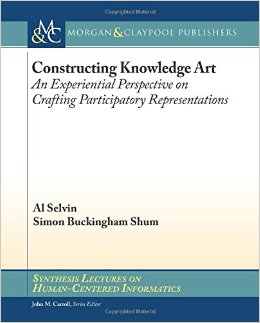
This book is about how people (we refer to them as practitioners) can help ibsonuide participants in creating representations of issues or ideas, such as collaborative diagrams, especially in the context of Participatory Design (PD). At its best, such representations can reach a very high level of expressiveness and usefulness, an ideal we refer to as Knowledge Art. Achieving that level requires effective engagement, often aided by facilitators or other practitioners. Most PD research focuses on tools and methods, or on participant experience. The next source of advantage is to better illuminate the role of practitioners-the people working with participants, tools, and methods in service of a project’s larger goals. Just like participants, practitioners experience challenges, interactions, and setbacks, and come up with creative ways to address them while maintaining their stance of service to participants and stakeholders. Our research interest is in understanding what moves and choices practitioners make that either help or hinder participants’ engagement with representations. We present a theoretical framework that looks at these choices from the experiential perspectives of narrative, aesthetics, ethics, sensemaking and improvisation and apply it to five diverse case studies of actual practice.
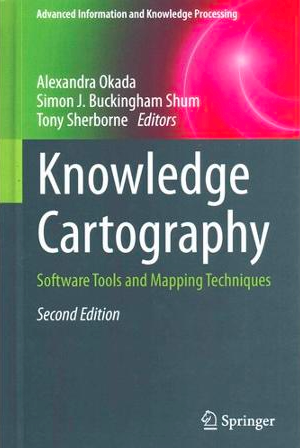
This book focuses on the process by which manually crafting interactive, hypertextual maps clarifies one’s own understanding, communicates it to others, and enables collective intelligence. The authors see mapping software as visual tools for reading and writing in a networked age. In an information ocean, the challenge is to find meaningful patterns around which we can weave plausible narratives. Maps of concepts, discussions and arguments make the connections between ideas tangible – and critically, disputable. With 22 chapters from leading researchers and practitioners (5 of them new for this edition), the reader will find the current state-of-the-art in the field. Part 1 focuses on knowledge maps for learning and teaching in schools and universities, before Part 2 turns to knowledge maps for information analysis and knowledge management in professional communities, but with many cross-cutting themes: · reflective practitioners documenting the most effective ways to map · conceptual frameworks for evaluating representations · real world case studies showing added value for professionals · more experimental case studies from research and education · visual languages, many of which work on both paper and with software · knowledge cartography software, much of it freely available and open source · visit the companion website for extra resources. Knowledge Cartography will be of interest to learners, educators, and researchers in all disciplines, as well as policy analysts, scenario planners, knowledge managers and team facilitators. Practitioners will find new perspectives and tools to expand their repertoire, while researchers will find rich enough conceptual grounding for further scholarship.
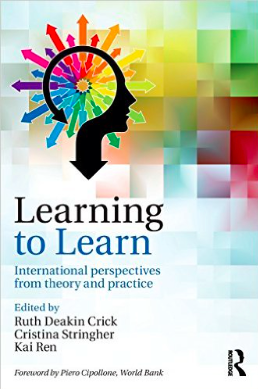
Learning to Learn provides a much needed overview and international guide to the field of learning to learn from a multidisciplinary lifelong and lifewide perspective. A wealth of research has been flourishing on this key educational goal in recent years. Internationally, it is considered to be one of the key competencies needed to compete in the global economy, but also a crucial factor for individual and social well-being. This book draws on leading international contributors to provide a cutting-edge overview of current thinking on learning to learn research, policy, and implementation in both formal and informal learning environments.
But what learning to learn is exactly, and what its constituting elements are, are much debated issues. These seem to be the crucial questions if assessment and development of this ‘malleable side of intelligence’ are to be accomplished. The approach of this volume is to consider a broad conception of learning to learn, not confined to only study strategies or metacognition, yet acknowledging the importance of such elements.
The book sets out to answer five main questions:
- What is learning to learn?
- What are its functions and how do we assess it?
- What does it promise to the individual and society at large?
- How is it conceived in national curricula internationally?
- How can it be developed in a variety of contexts?
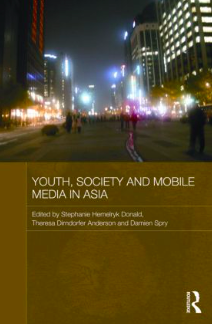
This book examines the influence of mobile media technology on the lives of young people in East and North Asia, South East Asia and Australia. It discusses the impact information communication technologies have today on social identity, well-being, participation and exclusion. It explores current media practices and their innovative, transformative and disruptive uses at the local, the regional, the national, and the global level. In particular, it analyses mobile media not as a discrete object, but rather as part of a dynamic communication and information environment in which human-object relations are constantly reconfigured. It covers key theoretical and conceptual themes in youth mobile media research focusing on social, cultural and political aspects, including coverage of key themes such as regulation and technology, practices, pedagogies, aesthetics, social change, and representations of mobile youth. The book includes new accounts of recent research into the uses of mobile media by young people, and how these are situated in a broader socio-political context. Case studies include mobile panics in Australia (the notorious Kings of Wirrabee sexual assault case) and Japan (the scandals of high school girls as teenage prostitutes) in which mobile media use has had significant impact. This book offers an up-to-date examination of the influence of information communication technologies on young people’s lives in the region.

Essentially personalised learning, or ‘personalising learning’, is an ideology which inspires an education service to meet the diverse needs of individuals and groups, rather than operating a ‘one size fits all’ model of provision. Education services must take a responsive approach and be ‘designed around the needs of each child’. Personalising learning is the driver which moves us from a 19th century ‘educational imaginary’ to a 21st century ‘educational imaginary’ – from the unquestioned assumptions about the social and moral order of education which underpinned modernity to a changing set of social and moral assumptions which are more suited to the globalised, information age of ‘post modernity’. This is a movement from a from a Fordist metaphor of knowledge production to an ecological metaphor of sustainable learning.

What kind of learner are you? How can you become a better learner?
This book puts the findings of the well known Effective Lifelong Learning Inventory (ELLI) research programme into the practical context of the classroom, helping you to find answers to these questions. The book offers many suggestions for practical ways to improve the learning power of all the children in your class. It looks at • learning power – what it is and how it can be achieved • creating the right classroom environment for powerful learning • how learning power works in the primary and secondary school classroom • how animal metaphors can be used with children to explain concepts. This is an exciting read for anyone interested in how children learn, and how we can help them to learn more effectively. It fits in very well with the debate around such concepts as accelerated learning, thinking skills and learning styles.
Computer Supported Argument Visualization is attracting attention across education, science, public policy and business. More than ever, we need sense-making tools to help negotiate understanding in the face of multi-stakeholder, ill-structured problems. In order to be effective, these tools must support human cognitive and discursive processes, and provide suitable representations, services and user interfaces. Visualizing Argumentation is written by practitioners and researchers for colleagues working in collaborative knowledge media, educational technology and organizational sense-making. It will also be of interest to theorists interested in software tools which embody different argumentation models. Particular emphasis is placed on the usability and effectiveness of tools in different contexts.
This book is about how a school can embed its values in the core business of learning and teaching within the framework of a highly tested, pre-scribed curriculum. It tracks the relationships between a learning community’s vision and values and the central task of learning, growth and human development. Once a community has decided ‘what really matters around here’ their core values function as a vehicle for whole child development as well as a ‘third voice’ in the development of creative and critical thinking skills, alongside the ‘first voice’ of the experience of the student and the ‘second voice’ of the curriculum framework. Although this reports on a case study from the late 90’s the challenge of high stakes testing and pre-scribed curricula versus the development of 21C competences is as cogent as ever.
Chapters
Buckingham Shum, S. (2024). What could Learning Analytics learn from Human-Computer Interaction theory? In: Kathryn Bartimote, Sarah Howard & Dragan Gašević (Eds.), Theory Informing and Arising from Learning Analytics. Springer Nature. https://doi.org/10.1007/978-3-031-60571-0_10 [preprint]
Anderson, T.D. (2023), Looking at Securitization as a Sociotechnical Activity: Lessons From a Cold War Past for AI Futures. IEEE Technology and Society Magazine, vol. 42, no. 2, pp. 62-70. https://doi.org/10.1109/MTS.2023.3275629
Anderson, T.D. (2023), Trust building for data sharing – understanding trust as a social relationship. Chapter 4 in Data and the Digital Self: What the 21st Century Needs (Australian Computer Society). https://www.acs.org.au/insightsandpublications/reports-publications/data-and-the-digital-self.html
Buckingham Shum, S. (2022). Embedding Learning Analytics in a University: Boardroom, Staff Room, Server Room, Classroom. In Viberg, O. and Grönlund, Å. (Eds.), Practicable Learning Analytics, SpringerNature. [preprint]
Wise, A. F., Knight, S., & Buckingham Shum, S. (2021). Collaborative learning analytics. International handbook of computer-supported collaborative learning, 425-443. Springer, Cham. http://doi.org/10.1007/978-3-030-65291-3_23
Buckingham Shum, S. (2020). Moodoo: Indoor Positioning Analytics for Characterising Classroom Teaching. Proceedings of the 21st International Conference on Artificial Intelligence in Education (AIED2020). http://dx.doi.org/10.1007/978-3-030-52237-7_29
Kitto, K., Cutrupi, J., Philips, M., Gardiner, G., Ghodrati, M., Buckingham Shum, S. (2019). The connected university: Connectedness Learning across a lifetime. Higher Education and the Future of Graduate Employability: Edward Elgar Publishing 230-349. https://doi.org/10.4337/9781788972611.00023
Knight, S., & Littleton, K. (2015). Learning through Collaborative Information Seeking. In P. Hansen, C. Shah, & C.-P. Klas (Eds.), Collaborative Information Seeking: Best practices, New Domains, New Thoughts. Springer.
Newman, K., Knight, S., Elbeshausen, S., & Hansen, P. (2015). Situating CIS – The importance of Context in Collaborative Information Seeking. In P. Hansen, C. Shah, & C.-P. Klas (Eds.), Collaborative Information Seeking: Best practices, New Domains, New Thoughts. Springer.
Knight, S., & Littleton, K. (2015). Thinking, Interthinking, and Technological Tools. In R. Wegerif, L. Li, & J. C. Kaufman (Eds.), The Routledge International Handbook of Research on Teaching Thinking. Routledge. Individual chapter from http://oro.open.ac.uk/39309/
Knight, S. (2014). Finding Knowledge: What Is It To “Know” When We Search? In Society of the Query Reader: Reflections on Web Search. Amsterdam, The Netherlands: Institute of Network Cultures. Whole book available online. Individual chapter from http://oro.open.ac.uk/39307
Reports

Lodge, J. M., Howard, S., Bearman, M., Dawson, P, & Associates (2023). Assessment reform for the age of Artificial Intelligence. Tertiary Education Quality and Standards Agency, Australia.
The emergence of generative artificial intelligence (AI), while creating new possibilities for learning and teaching, has exacerbated existing assessment challenges within higher education. However, there is considerable expertise, based on evidence, theory and practice, about how to design assessment for a digital world, which includes artificial intelligence. AI is not new, after all, even if the current iterations of generative AI are. This document, constructed through expert collaboration, draws on this body of knowledge and outlines directions for the future of assessment. It seeks to provide guidance for the sector on ways assessment practices can take advantage of the opportunities, and manage the risks, of AI, specifically generative AI.
Gulson, K., Thompson, G., Swist, T., Kitto, K., Rutkowski, L., Rutkowski, D., Hogan, A., Zhang, V., Knight, S. (2022). Automated Essay Scoring in Australian Schools: Collective Policymaking. Policy Brief, November 2022. Education Innovations Policy Brief Series ISSN 2653-6757. Sydney Social Sciences and Humanities Advanced Research Centre (SSSHARC), University of Sydney, Australia.
This summary outlines critical issues associated with the use of Automated Essay Scoring (AES) technology in the Australian education system. The key insights presented in this paper emerged from a collaborative, multi-stakeholder workshop held in July 2022 that explored an automated essay-scoring trial and generated future possibilities aligned with participant interests and expertise. Drawing on the workshop and our expert understanding of the wider landscape, we propose recommendations that can be adopted by various stakeholders, schools, and educational systems.
Note: CIC researcher Kirsty Kitto contributed to the workshop design and reporting of this multi-institutional report. This is also of interest since the workshop followed a Technical Democracy methodology:
“The workshop adopted a technical democracy approach and was held as a hybrid forum, a methodology that has proved useful in response to specific socio-technical controversies. A hybrid forum uses collective learning and experimentation to allow for greater amplification of diverse perspectives and ideas than more traditional policy forums. One reason for adopting this approach was to explore the potential of controversy to inform future research, practice, and policy around technology in education.” [from the full White Paper]
…which is similar to the Deliberative Democracy process used in the EdTech Ethics report below.
Buckingham Shum, S. (2022), The UTS “EdTech Ethics” Deliberative Democracy Consultation: Rationale, Process and Outcomes. Connected Intelligence Centre, University of Technology Sydney, AUS. Published online 31 January, 2022. [Website]
This report has been written to document a novel community consultation process, using the principles and methods of Deliberative Democracy to consult with the UTS community on the following brief: What principles should govern UTS use of analytics and artificial intelligence to improve teaching and learning for all, while minimising the possibility of harmful outcomes? The reports concludes: “Deliberative Democracy, even when conducted wholly online, would appear to offer educational institutions an approach to address the urgent need for meaningful student/staff consultation on the ethical implications of introducing Learning Analytics and Artificial Intelligence into teaching and learning. The implementation process is now beginning, which we will be studying with equal interest.”
Kitto, K., Lupton, M., Bruza, P., Mallett, D., Banks, J., Dawson, S., Gasevic, D., Buckingham Shum, S., Pardo, A., Siemens, G. (2020). Learning Analytics beyond the LMS: Enabling Connected Learning via Open Source Analytics in ‘the wild’. Queensland University of Technology and University of Technology Sydney, AUS.
“Abstract: This project explored the dynamic between the need for teaching innovation alongside the need for the formal administration of education technologies. The project sought to identify a solution that would enable educational innovators to teach across platforms and systems using authentic real-world technologies, while recognising the need for quality, privacy, ethics and data control. Project outcomes demonstrate that it is possible to provide rich and authentic learning experiences for students ‘in the wild’…”
Kitto, K., Whitmer, J., Silvers, A.E. and Webb, M. (2020). Creating Data for Learning Analytics Ecosystems. Position Paper, Society for Learning Analytics Research.
Learning is a complex process that involves rich interactions between people, politics, places, and increasingly, technology. Using clickstream data to provide deep insights into learning requires care and a system-wide approach. We need learning analytics ecosystems. This position paper discusses the challenges faced by institutions as they seek to wrangle data from a portfolio of technology products and services to deliver rich learning experiences. It identifies a number of systemic failures that are leading many institutions to collect a large quantity of data that yields very few educationally relevant insights; from a lack of data policies to competition between vendors and standards. This position paper provides several high-level recommendations for three different sets of stakeholders to consider as they move towards a more mature implementation of LA: (i) Institutions procuring EdTech products; (ii) EdTech vendors seeking to deliver analytics products, and (iii) The LA community of practitioners. We also provide detailed evidence and examples in a series of appendices that are pitched at more technical members of your organisation as you seek to build a robust and useful learning analytics ecosystem.
Buckingham Shum S, Kitto K. (2019). The Ethics of Learning Analytics in Australian Higher Education. A Discussion Paper . Melbourne CSHE, 1 Jun 2019.
“Abstract: The purpose of this discussion paper is to explore the key ethical issues regarding the use of learning analytics and to provide guidance on how these might be considered. It has been compiled by a group of learning analytics experts to promote discussion of ethical principles, approaches to learning analytics, and topics that still require further consideration, particularly in the Australian Higher Education context..”
Shibani A, Knight S and Buckingham Shum S. (2018). Understanding Students’ Revisions in Writing: From Word Counts to the Revision Graph . Technical Report CIC-TR-2018-01, Connected Intelligence Centre, University of Technology Sydney.
“Abstract: Text revision is regarded as an important process in improving written products. To study the process and products of this revision activity from authentic classroom contexts, this report provides an exemplification of methods involving text analysis and visualization. These analyses open up the possibility of exploring the features of text to understand writing revision and the stages in students’ revision of drafts, which can lead to further automation of revision analysis for researchers, and formative feedback to students on their writing. A novel Revision Graph is introduced to aid detailed analysis of the writing process. This could be automated and applied to study the direct impact of automated feedback on students’ revisions and written outputs, thus evaluating its effectiveness in pedagogic contexts.”
Buckingham Shum S. and McKay, T.A. (2018). Architecting for Learning Analytics: Innovating for Sustainable Impact. EDUCAUSE Review, March/April 2018, pp. 25-37.
“Abstract: In light of the significant investments that some colleges and universities are making in their analytics infrastructures, how can an institution architect itself to tackle substantial, strategically important teaching and learning challenges? How can an institution innovate learning analytics for sustainable impact?.”
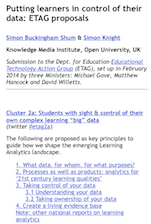
Putting Learners in Control of their Data. The Open University’s Knowledge Media Institute submission to the UK Dept. for Education, Educational Technology Action Group (ETAG), set up in February 2014 by three Ministers: Michael Gove, Matthew Hancock and David Willetts.
“The following are proposed as key principles to guide how we shape the emerging Learning Analytics landscape: 1. What data, for whom, for what purposes?; 2. Processes as well as products: analytics for ‘21st century learning qualities’; 3. Taking control of your data; 4. Create a living evidence base.”
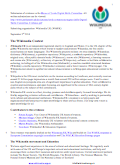
Wikimedia UK (WMUK) evidence submission to the House of Lords Digital Skills Committee (September 3rd 2014). All written submissions: PDF
“Conclusion: There is an expectation that the fostering of digital skills in the 21st Century will take place in an ‘always on’ open environment. For the potential of such developments to come to fruition, legislative change around the opening of cultural heritage, and innovation around education design both need support. ‘Open’ practices are not simply about copyright reform and open licensing of public materials; they embody the kinds of literacies – informational and digital – required in the digital environment, and as such deserve consideration as important ‘digital skills’.”
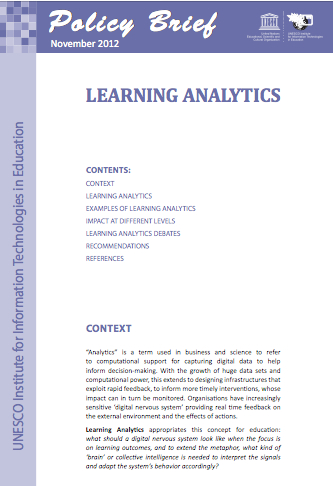
Learning Analytics is a rapidly growing research field and commercial , with potentially disruptive potential. While educationalresearchers have for many years used computational techniques toanalyse learner data, generate visualizations of learning dynamics,and build predictive models to test theories — for the first time, these techniques are becoming available to educators, learners and policy makers. Learning analytics promise is to transform educational research into a data-driven science, and educational institutions into organisations that make evidence-based decisions. However, critical debate is needed on the limits of computational modelling, the ethics of analytics, and the educational paradigms that learning analytics promote.
